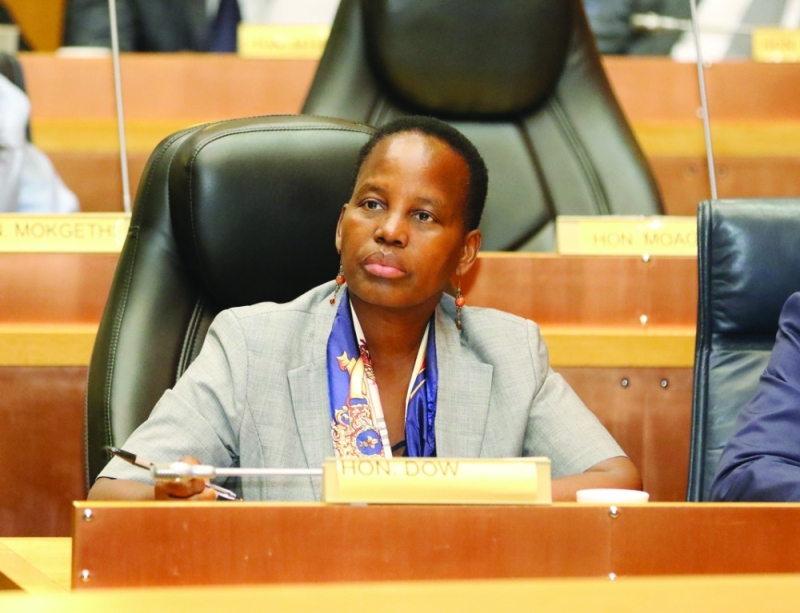The DIS: A government problem
Dolly Byrone Thebe | Monday November 22, 2021 06:00


But her lament, just like the voices of dissent that came before hers, might suffer the same fate of falling on deaf ears. A strong case has been made. And there is no doubt. The Directorate of Intelligence and Security (DIS) is a rogue institution. This is an incontestable appraisal.
Many agree with this. Yet there is still no clarity as to how the loose cannon can be tamed and cut to size. Dow is of the view that the system can redeem itself. That government is capable of providing a solution to a problem it deliberately created. To achieve this end, she proposed institution of a Commission of Inquiry. History refutes Dow’s position.
Commissions of Inquiries have been established before at a cost but produced little or no impact. History has no record of any evil system that truly and genuinely managed to reform itself. The Apartheid system next door did not recoil of its own accord. Apartheid succumbed to pressure. And so was the communist Soviet Union. The big question is, what did the nation expect? Here is a reality check. There is nothing like a nice and well groomed intelligence community. They are bad by nature. And certainly they are not manned by saints. Throughout the world intelligence communities from the Russian CHEKA and KGB, USA’s CIA, Israel’s MOSSAD, South African BOSS have been associated with mounting of propaganda and disinformation, staging show trials against perceived or real enemies of the State, elimination and assassination of dissidents and political rivals, arbitrary arrests and detentions. Theirs is a scary, secretive and dark world. Expecting accountability from a secretive entity is to expect too much. Here is what Gloria Naylor had to say about the intelligence community: “The intelligence community, for the most part, has no accountability at all; to the Congress, to us the American people, and so they feel that they are above the law. In apartheid South Africa the directors of the Intelligence community answered directly and only to the Prime Minister.” This is no different from the situation that obtains in our jurisdiction today, where the DIS’s director-general, Peter Magosi reports to the presidency. Other oversight institutions created by the Constitution as Dow observed, have been emasculated and relegated into the background. History points to a close and intimate link between the State and the conduct of the intelligence community.
The KGB was a political instrument in the hands of Joseph Stalin and assisted him to consolidate power. It served Stalin well in the implementation of his radical agricultural reforms and persecution of the wealthy farmers (kulaks) and other dissidents. The intelligence community cannot be divorced from the overall intentions and goals of the government of the day. Whatever Magosi is up to cannot be carried out without sanction from his political principals. He cannot of his own accord suddenly go rogue and flout the law without inspiration from his principals. Either out of deference or fear of the President, Dow conveniently chose to delink the actions of the DIS from those of government as a whole. The whole idea was to create an impression that the DIS is a problem child engaged in isolated bizarre actions. This cannot be true.
Narrowing the issue to the conduct of the DIS is an understatement of the problem at hand. The problem is much bigger than the DIS. It is a government problem. It is a systemic problem requiring an overhaul of the government machinery. Executive overbearing continues to suffocate oversight institutions that were supposed to keep democracy running. The DG of the DIS is a political appointee and he is therefore, fully conscious of the fact that nothing guarantees him job security than a BDP return to power. It is therefore, not surprising to see the DIS involved in a sustained campaign of disinformation and propaganda against prominent members of the opposition. The DIS featured prominently in Kang when former legislator Pelonomi Venson-Moitoi challenged Masisi for the BDP presidency. DIS is on a fishing spree, seeking to intimidate and cow into submission Isaac Kgosi, who harbours State secret by virtue of his former position as director-general of the DIS. His recent flirting with the opposition will not do his cause any good.
Former president Ian Khama is not enjoying his peace because he committed a political crime of joining the opposition. The DIS behaviour is no strange but conforms to the norm. It was created to conduct general surveillance of the public, protect the political leadership and jut like its counterparts elsewhere. it has recently assumed the responsibility of arresting, imprisoning, searching homes especially of real or imagined enemies of the state. Botswana is suffering reputational damage at the expense of political expediency. The truth of the matter is that it is an illusion to expect the system to reform itself from above. Genuine and sustainable reforms are best orchestrated from below.
